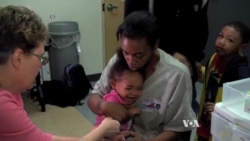The feverish debate over American vaccination policy – sparked by a measles outbreak in December and fanned this week by potential Republican presidential candidates’ comments – has not yet run its course.
Presumptive candidates Chris Christie and Rand Paul injected the dimension of 2016 presidential politics into the debate, saying parents should have some choice when it comes to vaccinating their children against diseases.
And White House spokesman Josh Earnest, at Tuesday’s daily press briefing, shied away from calling for an inoculation mandate.
"The president believes it shouldn’t require a law for people to exercise common sense and do the right thing," Earnest said. "… This is the right thing for them to do both by their own children, but by also other children in the community. They have a responsibility to do this."
Measles was declared eliminated from the United States in 2000. But since-debunked theories linking vaccines and autism have led some Americans to decide against having their children vaccinated. So-called "anti-vaxers" are being criticized in the wake of a measles outbreak that began in California in December and has sickened more than 100 among 14 states.
New Jersey Governor Christie fanned the contentious debate over vaccines during a three-day trip to England early this week, intending to concentrate on foreign policy.
Christie, while touring a Cambridge biomedical research facility that makes vaccines, was asked about his views on immunizing children.
"All I can say is we vaccinated ours," Christie said, adding that "parents need to have some measure of choice in things as well, so that’s the balance that the government has to decide."
Rand Paul takes a shot
Paul, the Kentucky Republican senator known for his libertarian views, also weighed in.
Interviewed Monday on the CNBC cable channel, Paul said he’d heard of "many tragic cases of children who wound up with profound mental disorders after vaccines."
"I am not arguing vaccines are a bad idea," said Paul, an ophthalmologist. “I think they are a good thing. But I think the parents should have some input.”
Late Tuesday afternoon, Rand tweeted to his 538,000 Twitter followers: "Ironic. Today I am getting my booster vaccine. Wonder how the liberal media will misreport this?"
The tweet included a photo of his immunization.
Some parents worry about possible side effects of vaccines, often citing disproved theories that vaccines are connected to autism or developmental disorders.
"Some kids have such adverse effects to them, and if you go online and read, there are horrific stories," said Barbara Acosta, a parent in California, where the outbreak originated.
Health experts defend vaccines
But public health experts told Congress at a hearing Tuesday that parents who refuse to have their kids vaccinated not only put their children in harm’s way but also put others at risk.
"You have one of the most highly effective vaccines against any virus and you have a highly contagious disease, measles, that can have serious complications. So to me, it is really a slam dunk," said Dr. Anthony Fauci, director of the National Institute of Allergy and Infectious Diseases, in a staunch defense of immunization.
The measles virus spreads through coughing and sneezing, and it “can live for up to two hours on a surface” or in air contaminated by an infected person, according to the U.S. Centers for Disease Control and Prevention.
The virus triggers symptoms such as high fever, cough, runny nose and a rash. Complications range from pneumonia to ear infections. In worst cases, measles can lead to convulsions, mental retardation or even death.
Likely Democratic presidential frontrunner Hillary Clinton tweeted, “the science is clear, vaccines work.”
Republican House Speaker John Boehner agreed. “Well, I do not know that we need another law, but I do believe that all children ought to be vaccinated.”
As a presidential candidate in 2008, Barack Obama said the science on the safety of vaccinations was inconclusive.
But his view has changed as president, said his spokesman, Earnest. "The science is clear, and it is irresponsible for people to not get their children vaccinated," the spokesman said Tuesday.
Exemptions and immunization rates
All 50 states have legislation requiring vaccinations for students, though the rules vary, the National Conference of State Legislatures reports. All grant exemptions based on medical concerns, almost all allow exemptions for religious reasons and 20 do so for personal beliefs. Two states – Mississippi and West Virginia – only permit medical exemptions.
A Pew poll last year found 68 percent of Americans believe vaccinations should be required for all children, while 30 percent said parents should decide.
But actual immunization rates are considerably higher. For instance, at least 93 percent of kindergarteners in the 2013-14 academic year had been vaccinated, the U.S. Centers for Disease Control and Prevention reported.
Republican strategist Phillip Stutts said he sees the vaccine debate as a preview of a spirited and unpredictable Republican Party primary campaign.
"We should have a very robust, huge debate," Stutts said. "… We are going to have smart candidates that talk big policy ideas that change this country in ways that I am very excited about."
VOA's Carol Guensburg contributed to this report.







